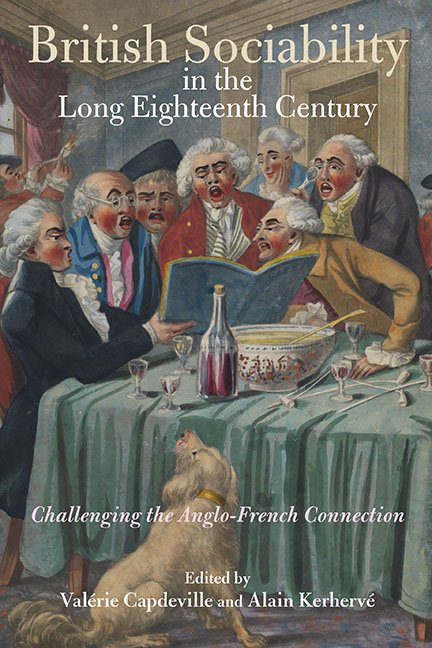Book contents
- Frontmatter
- Contents
- List of illustrations
- List of contributors
- Foreword
- Acknowledgements
- Introduction
- Part 1 Emergence of new political and social practices
- Part 2 Competing models of sociability
- Part 3 Paradoxes of British sociability
- 10 In company and out: the public/private selves of Johnson and Boswell
- 11 Friendship and unsociable sociability in eighteenth-century literature
- 12 The anti-social convivialist: toasting and resistance to sociability
- 13 Sociability and the Glorious Revolution: a dubious connection in Burke's philosophy
- 14 Respectability vs political agency: a dilemma for British radical societies
- Conclusion
- Bibliography
- Index
14 - Respectability vs political agency: a dilemma for British radical societies
from Part 3 - Paradoxes of British sociability
Published online by Cambridge University Press: 18 September 2019
- Frontmatter
- Contents
- List of illustrations
- List of contributors
- Foreword
- Acknowledgements
- Introduction
- Part 1 Emergence of new political and social practices
- Part 2 Competing models of sociability
- Part 3 Paradoxes of British sociability
- 10 In company and out: the public/private selves of Johnson and Boswell
- 11 Friendship and unsociable sociability in eighteenth-century literature
- 12 The anti-social convivialist: toasting and resistance to sociability
- 13 Sociability and the Glorious Revolution: a dubious connection in Burke's philosophy
- 14 Respectability vs political agency: a dilemma for British radical societies
- Conclusion
- Bibliography
- Index
Summary
PLEBEIAN SOCIETIES, and especially the most famous of them, the London Corresponding Society (LCS), were a novelty and a defining feature of the political landscape of Britain in the 1790s. Those societies sprouted across London, the Midlands and the North of England and many Scottish towns and cities when the publication of Thomas Paine's Rights of Man (in two parts, 1791 and 1792) gave an impetus to reform movements and articulated a republican, anti-aristocratic, popular ideology. Drawing their membership largely but not exclusively from among the disenfranchised artisan classes, popular societies agitated for a thoroughgoing reform of parliamentary representation, including universal manhood suffrage, annual (or very frequent) elections, a fair representation of cities, the abolition of rotten boroughs, pensions, sinecures and other forms of royal, aristocratic and government patronage. Although extra-parliamentary politics existed, and popular participation in political rituals such as elections was usual, and indeed expected, in England before the 1790s, the LCS and similar societies challenged the established order, as the initiative came from disenfranchised subjects. They were no longer expressions of a deferential political culture monitored by local élites, but posed a challenge to it. The government and conservative sectors of public opinion could not believe that mere artisans could set up political associations by themselves and they suspected that they were manipulated by aristocrats or wealthy individuals. In the history of political sociability, large popular societies are of interest because they tried, with a considerable degree of success, to devise democratic rules of procedure, to attract new members among the disenfranchised and to educate them into citizenship. But those attempts at a democratic sociability were fraught with difficulties, because the norms of respectability – which were to be followed in order to be considered respectable and, by implication, worthy of the suffrage and a legitimate political opinion – constrained the radicals’ room for manoeuvre, their agency. They were faced with the choice of adhering to middle-class norms in order to be taken seriously and earn their badges of citizenship, or to act up and flout conventions. The LCS, or at least its official instances and its authorised spokesmen, adopted the respectable strategy – a precarious one, given that the context of war with France made the expression of deviant political expression more and more difficult and, after December 1795, virtually untenable.
- Type
- Chapter
- Information
- British Sociability in the Long Eighteenth CenturyChallenging the Anglo-French Connection, pp. 251 - 270Publisher: Boydell & BrewerPrint publication year: 2019

